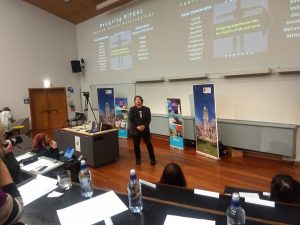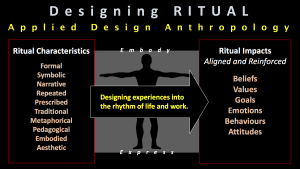We are ritual creatures
The 3 Minute Thesis competition is a lively annual event. This year Marshall Lewis, a Phd student in Otago’s Social Anthropology programme, competed in the University finals. We thought we’d share the content of his excellent presentation on ‘Ritual Design’ with you! …
“If you have goals that are important to you – and I bet you do – then you may want to design your rituals to support your goals. That’s the main idea behind my project.
So, very quickly: what do I mean by ritual, why use it and how might we design ritual?

Marshall Lewis delivering his presentation
Think of rituals as actions that embody and express your beliefs and values – you live your beliefs and values through ritual – perhaps not consciously. You may have waking rituals, hygiene rituals, eating, commuting, working, shopping, pre-game, post-sex, religious ritual – if you’re religious – even binging on Netflix can be ritual-like.
Why is life so ritualised?
Ritual scholarship is extensive and contentious. I’m focused on two basic propositions: First, there are discernible, family characteristics of ritual – some listed here – and secondly – and here’s why you should care – rituals work. Experimental psychologists have been demonstrating what coaches and drill sergeants have long known: rituals have real impact. For example, they can decrease anxiety, reduce grief, alleviate disappointment. Essentially, they can align and reinforce our beliefs and values.
And knowing that rituals work is real and useful knowledge. What might it look like to take this knowledge seriously: to apply ritual as a strategy or technology to support one’s goals and aspirations? That’s what my project is about. I am applying insights from the interdisciplinary study of ritual — from anthropology, organisational studies and religious studies – to do three things: to defend a conception of ritual as something to be designed; to evolve a practical method for designing ritual, and to apply this method in real-world environments.

Competitors in the 3 Minute Thesis competition are allowed a single powerpoint slide to accompany their 3-minute presentation, and this was Marshall’s image.
Two quick examples: First, I work in a large company that wants a collaborative culture, where people feel empowered to shape the future of the organisation. The question becomes: How might we design organisational rituals such as team meetings and problem-solving sessions if our goal is a collaborative culture?
Secondly, my youngest daughter is starting law school later this month, and she’s designing rituals to help maintain a healthy lifestyle during that period of intensity.
The ritual design method is straight forward, although far from easy. First, clarify your goal and the beliefs and values you want to reinforce (easier said than done!). Then, you design your rhythms and activities using the key characteristics of ritual as design principles. It’s a creative process, though analytically derived.
We are ritual creatures. Ritual is one of the key strategies humans use to bring some order and method to the challenges and chaos of life.
Good luck with your goals! And consider how your rituals can support you!”


